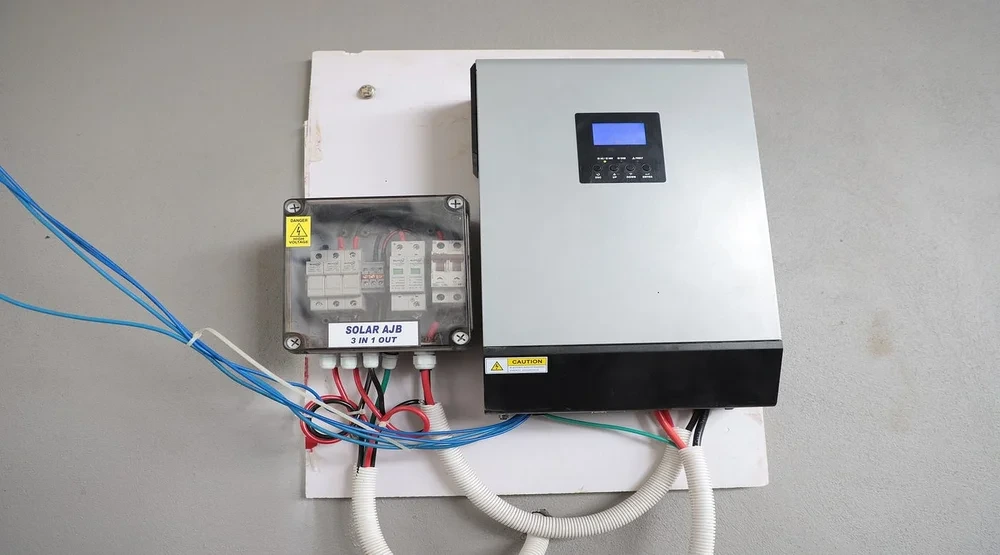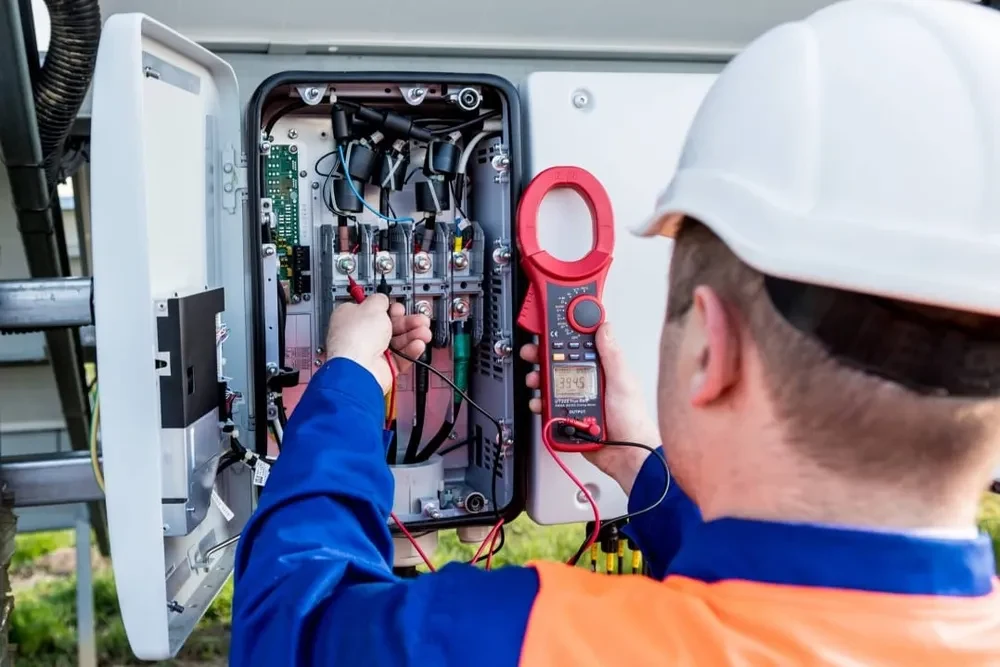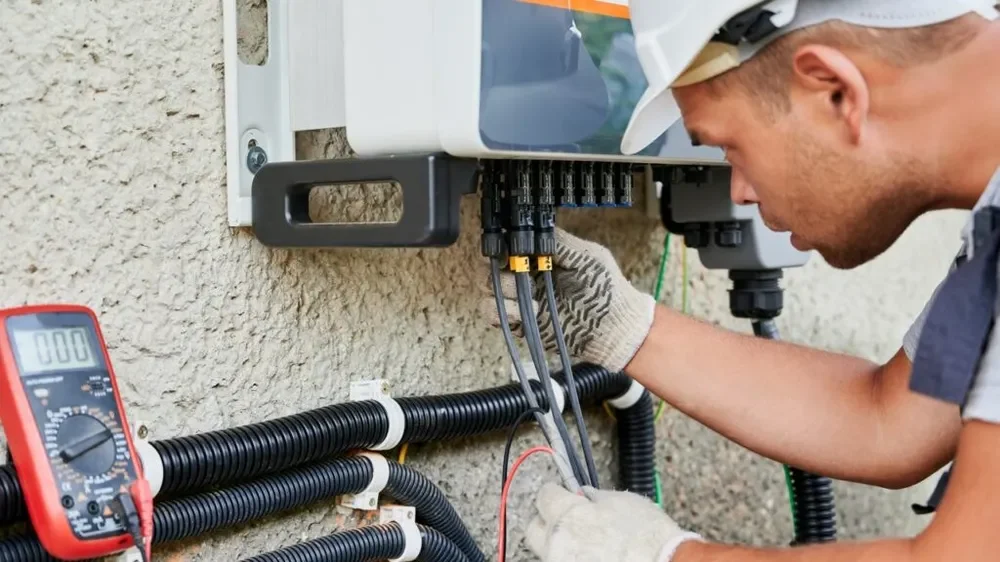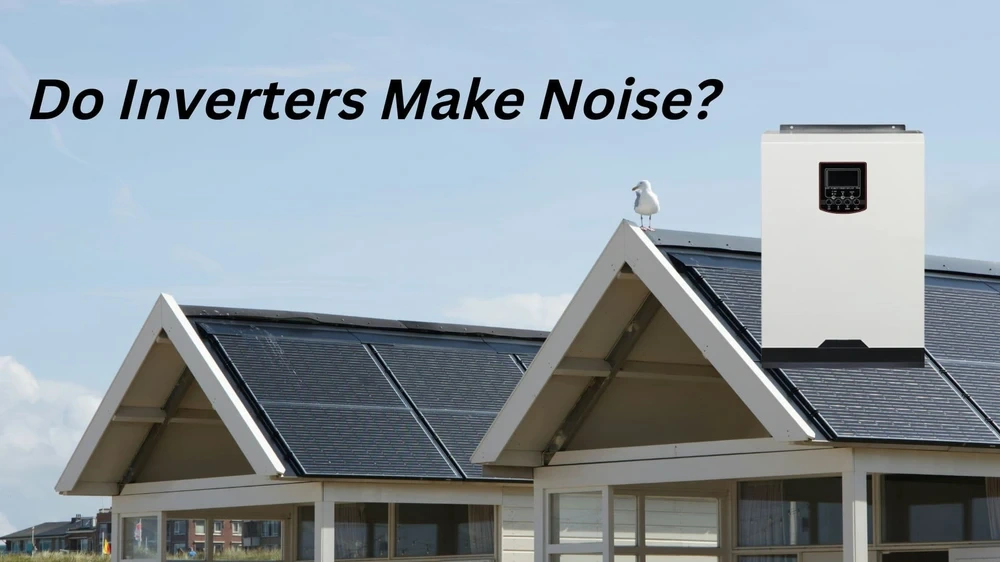Reducing noise from an inverter is important for any user who wants to maintain a quiet environment while using electronic devices. There are several common causes of inverters making noise, the first of which is a depleting battery capacity.
This is characterized by a rapid beeping sound that continues every minute or so. The inverter may be in battery mode and fail a self-test which leads to an alarm sound. In some cases, the wrong battery cable size is used. If the cable size is insufficient, it can lead to a voltage drop, leading to a buzzing noise from the inverter.
Secondly, too much power consumption by multiple devices simultaneously can lead to excessive demand on the inverter, resulting in more noise. Similarly, fluctuations in voltage can also contribute to this.
Understanding Inverter Noise
A humming noise or beeping sound from an inverter can signify that it’s not operating efficiently, prompting the need to check for any issues.
For one, keeping your unit in a well-ventilated space free of dirt and dust can help to reduce the noise. Paying attention to the cooling fan within the inverter can also make a difference. If it gets too hot, the fan will produce a loud humming sound as it works to cool the system.
Aside from that, battery mode is a common cause of beeping noises in inverters, especially if the inverter fails to self-test. If you notice a rapid beeping for a minute every 4 or 5 minutes, this could be the issue. In such cases, it’s recommended to charge the battery for a few hours and see if the problem persists.
Another common cause of inverter noise is the use of the wrong battery cable. An inappropriate cable size can lead to a voltage drop, causing the inverter to make excessive noise or emit a persistent beeping sound.
Common Causes of Inverter Noise
Understanding why an inverter makes noise is essential to finding ways to reduce it.
When an inverter is making noise, it’s worth investigating the battery cable size. If the cable is not sufficient to handle the power required, it can lead to a voltage drop, creating an unsettling buzzing sound. To resolve this, one might need to consider increasing the size of the cable or checking the battery’s capacity.
Other than that, the inverter fan should also be checked as its hum may hint at the potential for overheating.
If you notice any power fluctuations, a common cause is an overburdened system. To manage this, one could try distributing the power load evenly across different inverter systems to reduce inverter noise and maintain optimal battery cable size.
The Role of Battery Cables in Inverter Noise

A humming sound is typically caused by the normal functioning of the internal transformer within the inverter. However, a high-pitched beep or alarm sound often signals an issue that needs to be addressed.
Regular beeping every few minutes may point to a failed self-test, while rapid beeping might indicate that the inverter’s battery is dead and needs replacing.
The size of the battery cable also factors into this symphony of sounds. An undersized cable can lead to a voltage drop, which can result in the inverter making unwanted noises. Therefore, ensuring the battery cable size is sufficient for the inverter’s power requirements is a simple yet effective way to reduce noise.
If the irritating beep or buzzing noise continues despite adequate battery cable setup, attention may need to be redirected towards the solar inverter or the inverter battery itself, as it could be a symptom of a depleting battery capacity or insufficient battery cable size.
Why Inverters Make Noise
A common noise culprit is the cooling fan within the inverter. Pay close attention to this fan noise, as an unusually loud humming could signal that the fan is overworked, which could lead to an overheating inverter. Ensuring your inverter is in a well-ventilated area can help to improve this situation.
However, buzzing in the inverter could be due to various reasons. It can also be caused by the depletion of battery capacity or because of insufficient battery cable size. If your inverter is making a continuous, rapid beeping noise every 30 seconds or a minute every 4 or 5 minutes, it might be a sign of a failed self-test or an overly depleted battery. In this case, it may be best to investigate the inverter noise and check if it’s related to a voltage drop or wrong battery cable.
Addressing a Beeping Inverter

While using a solar inverter can alleviate the noise issue, it’s advisable to involve a professional technician if the problem persists, particularly if you notice a persistent buzzing or humming noise.
The noises could also be warning signs of a depleting battery capacity, an overworked power inverter, or an underperforming solar panel system. If these instances are the culprits, it would be best to replace or upgrade those components.
Regular maintenance checks help to prevent any unnecessary wear and tear that might cause your inverter to make noise.
Another factor to consider is the cooling fan. Keep the area around the inverter clean and well-ventilated to improve the functionality of the fan, this ensures the inverter will not overheat.
If you notice a high-pitched alarm sound, it’s the device’s way of signaling that something needs to be addressed. When this happens, it’s best to investigate the potential causes and execute the necessary resolutions.
Reducing Noise with an Inverter
The most common noises made by an inverter are humming, buzzing, and beeping. These noises might be due to depleting battery capacity, a wrong battery cable size, a failed self-test, an overheating fan, or the inverter making more noise than it should.
To reduce noise with an inverter, you can pay attention to the inverter fan, ensure a well-ventilated space, and keep the inverter clean from dirt and dust.
If your inverter continues to beep, this could be due to an insufficient battery cable size, the need for a self-test, or an overheating of the internal transformer. Inspect your battery cable setup and replace the cable if necessary.
Another common cause for inverter noise is the power source. Ensure you have a stable power supply to the battery and that the power load is divided evenly among the devices connected. This helps prevent depleting battery capacity and may lengthen the battery’s overall lifespan.
Key Facts About Inverter Noises
- An inverter can make noises such as humming or beeping due to issues like a depleting battery capacity, incorrect battery cable size, or a failed self-test.
- To reduce noise from an inverter, it’s important to ensure the inverter fan is functioning correctly, the space is well-ventilated, and the inverter is kept clean from dirt and dust.
- Beeping noises from an inverter could signify problems such as insufficient battery cable size, the need for a self-test, or overheating of the internal transformer.
- Another common cause of inverter noise is an unstable power source. Ensuring a stable power supply and evenly dividing the power load across connected devices can help prevent battery depletion and extend the battery’s lifespan.
The Link Between Power and Inverter Noise
Issues with the power supply to the battery or transformer are other potential causes for any alarming noise.
A rapidly depleting battery capacity can result in incessant beeping, which can be resolved by charging the battery for a few hours.
In some cases, excessive demand on the power inverter can also lead to voltage drops, causing a buzzing noise. It is, therefore, crucial to spread the power load evenly among connected devices and upgrade the battery cable size if required.
The inverter’s internal structure contains the fan and transformer, which can become noisy if they overheat. Keeping the equipment in a well-ventilated area and ensuring regular maintenance can help reduce such issues. If all else fails, it may be advisable to call a professional for an assessment.
Grasping the Humming Noise from an Inverter

When purchasing an inverter for your solar panel system, ensure there is a good self-test function, and understand the potential causes and solutions for a noisy inverter.
Inverters that make noise can become a nuisance, especially in a quiet environment. Common causes could include issues like overheating, transformer failure, or needing to change the battery cable. If the inverter is making an unusual noise or the noise increases suddenly, there are several solutions to try in order to reduce the noise.
Firstly, verify the power requirements of your inverter and ensure that the power load is evenly among the devices connected. In some cases, excessive demand on the inverter can lead to voltage fluctuations, which can in turn make the inverter produce a humming or beeping noise.
Secondly, pay attention to the fan. If the inverter fan is making too much noise, it may be due to dirt and dust that have accumulated over time. Cleaning the fan can help to reduce the noise significantly.
Important Facts About Noisy Inverters in Solar Panel Systems
- Excessive demand on the inverter can cause voltage fluctuations, leading to a humming or beeping noise.
- Dirt and dust accumulation can cause the inverter fan to make excessive noise, and cleaning it can significantly reduce the noise.
- Common causes for a noisy inverter include overheating, transformer failure, or the need to change the battery cable.
- Addressing these issues promptly can prevent further damage to the solar panel system.
Dealing with a Buzzing Inverter
Keeping your inverter in a clean and well-ventilated area can help in reducing the noise, particularly when an inverter produces a high-pitched alarm. Pay attention to the fan’s standard noise levels as any significant change could indicate a problem that needs to be addressed by a professional technician.
Another common cause of inverter noise is a rapid depletion of battery power. If your inverter starts to beep every 30 seconds or so, it’s an indication that the battery’s capacity is depleting quickly because of excessive power demand. In such cases, redistributing the power load evenly among the connected devices can help mitigate this issue.
Poor quality or incorrect power source can lead to voltage fluctuations which the inverter tries to regularize, thus creating noise. A solar inverter, for instance, should ideally be connected to a stable power source to avoid such issues.
Note that a normal, mild humming noise from the inverter does not indicate a failure, but rapid beeping or a high-pitched alarm sound might suggest a need for a check-up.
Troubleshooting Inverter Noise Issues

To rectify a continuous inverter noise, we highly recommend reaching out to a technician to resolve it quickly and safely. Especially if a high-pitched buzzing noise occurs every 30 seconds, this signals a problem with the normal power supply to the battery, which would need a special skillset to resolve. Also, beeps or alarm sounds, such as a continuous beep every 4 minutes, could indicate a failed self-test.
Beeping noises might also mean the inverter is in battery mode and may soon deplete its capacity. At times, the inverter may start making noise due to issues within the inverter itself, like a faulty cooling fan or transformer.
Similarly, the inverter may start beeping because of overheating, which requires immediate attention to prevent damage. Inverters can also make a humming noise if they are not well-ventilated or clogged with dirt and dust. This scenario affects the cooling fan and leads to excessive heat, causing the inverter to hum. Cleaning the inverter periodically and maintaining a well-ventilated environment can help reduce this noise.
Another common cause of power supply to battery power conversion failure is the inability to distribute the power load evenly among the system components.
Inverter Noise
- Inverter noise can be a sign of a problem with the normal power supply to the battery.
- Noises such as beeps or alarms could indicate a failed self-test or that the inverter is in battery mode.
- Issues within the inverter itself, such as a faulty cooling fan or transformer, can cause the inverter to make noise.
- Overheating, lack of ventilation, or dirt and dust can cause the inverter to make a humming noise.
The Impact of Solar Inverters on Noise
It’s harder to cool the inverter down when it’s clogged with dirt and dust, so pay attention to the fan and ensure the area is well-ventilated. In some cases, a buzzing sound can be heard because the inverter software is self-testing its functions. This is part of normal functioning and should not raise any concerns.
However, rapid beeping can mean a failed self-test. If this happens, it’s usually a sign of an internal issue with the inverter that should be addressed by a professional technician.
Inadequate battery cable size is another common cause of inverter noise. If the cable size is insufficient for the inverter’s power requirements, it can lead to a voltage drop, causing the inverter to make a humming or buzzing noise. To fix this issue, replace the battery cable with an appropriate size
Methods to Eliminate Noise from an Inverter
Excessive noise may indicate that too many devices are running on the inverter, in which case, switching off some non-essential devices might restore normal functioning. Ignoring the health of an inverter, particularly when many devices are connected, can inadvertently result in excessive energy demand often expressed as unwanted noise.
Other factors contributing to this issue are the use of an incorrect battery cable size leading to voltage fluctuations, a failed self-test, or an abnormally functioning internal transformer. It is critical to be aware of the noises signaling that the system is dead and requires attention.
Key Points About Inverter Noise and Energy Demand
- Excessive noise from an inverter may be due to high demand from too many devices running simultaneously. Reducing the number of active devices can restore normal functioning.
- Ignoring the health of an inverter, especially when many devices are connected, can lead to excessive energy demand and unwanted noise.
- Using an incorrect battery cable size is a major factor contributing to inverter noise, as it causes voltage fluctuations and auditory discomfort.
- Signs of a failing inverter include a failed self-test or an abnormally functioning internal transformer. These signs indicate that the inverter is working in battery mode and may require attention.




